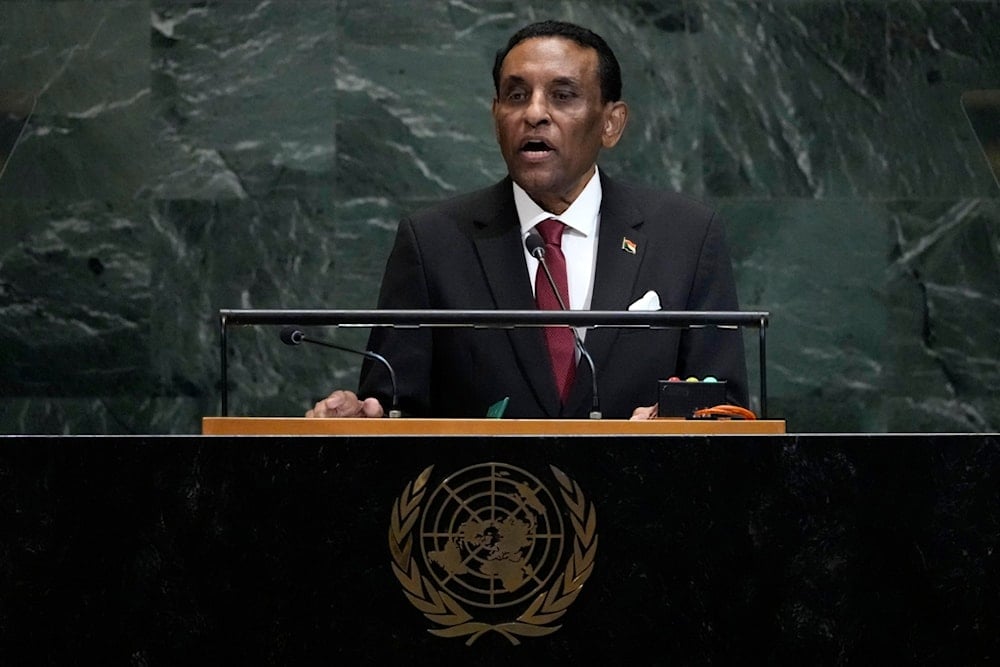UN warns of looming atrocities in Sudan’s North Darfur
The UN warns Al-Fashir faces famine and mass atrocities, urging urgent action to protect civilians from RSF attacks and ensure safe humanitarian access.
-

Transitional Prime Minister of Sudan Kamil El-Tayeb Idris addresses the 80th session of the United Nations General Assembly, Thursday, September 25, 2025, at UN headquarters (AP)
The United Nations High Commissioner for Human Rights issued an urgent appeal on Thursday for immediate action to prevent “large-scale ethnically motivated attacks and atrocities” in al-Fashir, the capital of North Darfur, Sudan.
Volker Turk, the UN rights chief, said in a statement that “Al-Fashir is on the brink of a greater catastrophe if urgent measures are not taken to ease the armed grip on the city and protect civilians.”
According to the UN Human Rights Office, at least 91 civilians were killed between September 19 and 29 in attacks carried out by the Rapid Support Forces (RSF), including drone strikes and ground incursions.
Turk warned of “patterns of ethnically driven violations, including sexual violence targeting Zaghawa women and girls, as seen during previous RSF assaults.” He called for a safe and voluntary corridor for civilians unable to flee, particularly the elderly and sick, and for unhindered humanitarian access.
The statement also highlighted that civilians are now “on the brink of famine” due to daily dwindling supplies, skyrocketing prices, and RSF restrictions. Reports of torture and killings linked to food smuggling were also cited.
UN humanitarian office sounds alarm
Denise Brown, the UN Resident and Humanitarian Coordinator for Sudan, described the humanitarian situation in Al-Fashir as catastrophic, warning that over a quarter of a million civilians face “impossible choices” between remaining trapped under siege or risking escape along routes plagued by violence and looting.
“Civilians trapped inside face unlawful killings, kidnappings, and arbitrary arrests, along with indiscriminate shelling of markets, hospitals, and places of worship, as the siege has dragged on for more than 500 days,” Brown said in her statement.
She stressed that international humanitarian law obliges all parties to protect civilians and guarantee safe passage for those wishing to leave, while ensuring those who remain receive immediate access to food, water, and medical supplies.
The UN also urged the protection of local responders and aid workers who continue to risk their lives to deliver assistance. It underscored the urgent need for “immediate steps” to protect the population, secure sustained humanitarian access, and guarantee the safe and voluntary departure of civilians who choose to leave.
RSF drone strike on Al-Fashir camp kills 75
A drone strike carried out by Sudan's paramilitary Rapid Support Forces (RSF) killed at least 75 people in late September at a displacement camp near the city of Al-Fashir in North Darfur, according to local rescue workers.
The attack targeted a mosque within the Abu Shouk camp, located just outside the besieged city. The Emergency Response Room, a local volunteer group managing relief efforts in the camp, confirmed the strike and the number of casualties.
"The bodies were retrieved from the rubble of the mosque," the group said in a statement.
There has been no immediate comment from the RSF regarding the incident.
Al-Fashir, the last army-held city in Darfur, has been under RSF siege for nearly 18 months. The fall of the city would give the RSF full territorial control over Darfur. The United Nations and rights organizations have already reported widespread atrocities in the region, including ethnically motivated killings.
The conflict between the Sudanese Armed Forces and the RSF, ongoing since April 2023, has devastated the country and plunged Darfur deeper into chaos.
Sudan war pushes millions into crisis
With communication lines severed in Al-Fashir, casualty reports remain difficult to verify, and aid coordination efforts face critical delays.
The Sudan war, now in its third year, has killed tens of thousands and displaced nearly 12 million people. The United Nations has described the situation as the world’s largest displacement and hunger crisis.
The country remains deeply divided: the army controls the north, east, and central regions, while the RSF dominates much of the south and most of Darfur. In the areas under its control, the RSF has started to establish parallel administrative structures, further complicating the conflict.

 4 Min Read
4 Min Read









